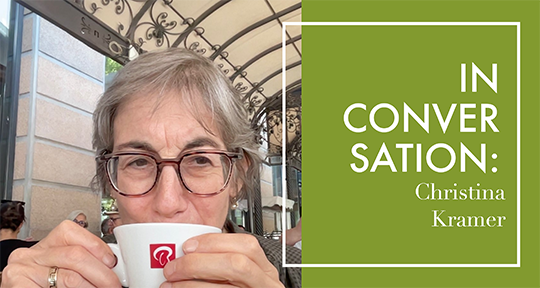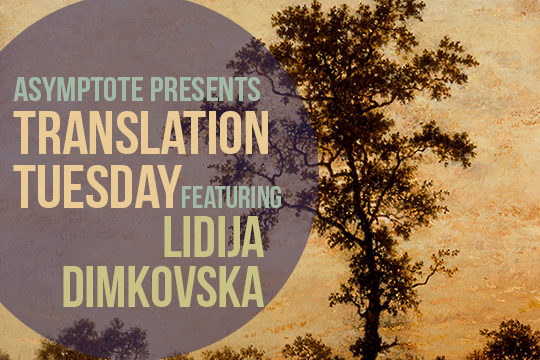This week, our editors-at-large give us a window into discussions about the importance of literature in translation across cultures—as something that connects people, responds to disaster, and creates community. Read on to find out more about a conference in India, one in the Balkans, new poems and essay collections, and more!
MARGENTO, Editor-at-Large, reporting from Spain and Belgium
Asymptote contributor Felix Nicolau translated a selection of poems by the Spanish poet Fulgencio Martinez for the latest issue of the Romanian journal Apostrof. Martinez visited the Romanian Language and Culture Centre (led by Nicolau) at University of Granada back in June which triggered a fruitful international conversation. Nicolau’s exquisite renditions bring witness to the Spanish poet’s vision of the lyric as both a haven from and a look into the world’s (and “any world’s”) political turmoil and injustice. Serendipitously, these translations speak to another groundbreaking event in the other literature I follow closely; the Belgian one.
The most remarkable recent event in Belgian Francophone letters is the release of Myriam Watthee-Delmotte’s collection of essays La littérature, une réponse au désastre (Literature, Response to Disaster) from Royal Academy of Belgium’s press. The internationally-awarded academic, writer, and essayist’s book has already received impressive coverage in Belgium and beyond. Watthee-Delmotte has also recently launched a novel, Indemne. Où va Moby-Dick? (Safe and Sound: Where’s Moby-Dick Headed?) with Actes Sud) and the two books are the subject of a two-episode interview podcast on Radio France Culture and also a streaming broadcast on for two weeks in a row (September 10th through the 25th). READ MORE…





 This spirit of formal ambition is by no means limited to our Special Feature. After all, “as the reality of each time changes,” says
This spirit of formal ambition is by no means limited to our Special Feature. After all, “as the reality of each time changes,” says 

Blog Editors’ Highlights: Winter 2025
Reviewing the manifold interpretations and curiosities in our Winter 2025 issue.
In a new issue spanning thirty-two countries and twenty languages, the array of literary offers include textual experiments, ever-novel takes on the craft of translation, and profound works that relate to the present moment in both necessary and unexpected ways. Here, our blog editors point to the works that most moved them.
Introducing his translation of Franz Kafka’s The Trial in 2012, Breon Mitchell remarked that with every generation, there seems to be a need for a new translation of so-called classic works of literature. His iteration was radically adherent to the original manuscript of The Trial, which was diligently kept under lock and key until the mid-fifties; by then, it was discovered exactly to what extent Max Brod had rewritten and restructured the original looseleaf pages of Kafka’s original draft. It is clear from Mitchell’s note that he considers this edit, if not an offense to Kafka, an offense to the reader who has lost the opportunity to enact their own radical interpretation of the work: an interpretation that touched Mitchell so deeply, he then endeavored to recreate it for others.
In Asymptote’s Winter 2025 Issue, the (digital) pages are an array of surprising turns of phrase and intriguing structures—of literature that challenges what we believe to be literature, translations that challenge what we believe to be originality, and essays that challenge what we believe to be logic. I am always drawn to the latter: to criticism, and writing about writers. As such, this issue has been a treat.
With the hundredth anniversary of Kafka’s death just in the rearview and the hundredth anniversary of the publication of The Trial looming ever closer, the writer-turned-adjective has not escaped the interest of Asymptote contributors. Italian writer Giorgio Fontana, in Howard Curtis’s tight translation, holds a love for Kafka much like Breon Mitchell. In an excerpt from his book Kafka: A World of Truth, Fontana discusses how we, as readers, repossess the works of Kafka, molding them into something more simplistic or abstract than they are. In a convincing argument, he writes: “The defining characteristic of genius is . . . the possession of a secret that the poet has no ability to express.” READ MORE…
Contributors:- Bella Creel
, - Meghan Racklin
, - Xiao Yue Shan
; Languages: - French
, - German
, - Italian
, - Macedonian
, - Spanish
; Places: - Chile
, - France
, - Italy
, - Macedonia
, - Switzerland
, - Taiwan
, - Turkey
; Writers: - Agustín Fernández Mallo
, - Damion Searls
, - Elsa Gribinski
, - Giorgio Fontana
, - Lidija Dimkovska
, - Sedef Ecer
; Tags: - dystopian thinking
, - identity
, - interpretation
, - nationality
, - painting
, - political commentary
, - revolution
, - the Cypriot Question
, - the Macedonian Question
, - translation
, - visual art
, - Winter 2025 issue
, - world literature